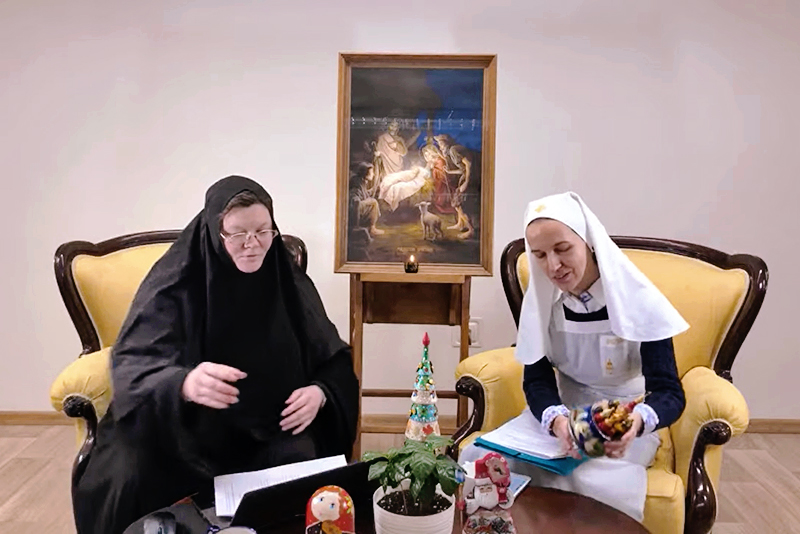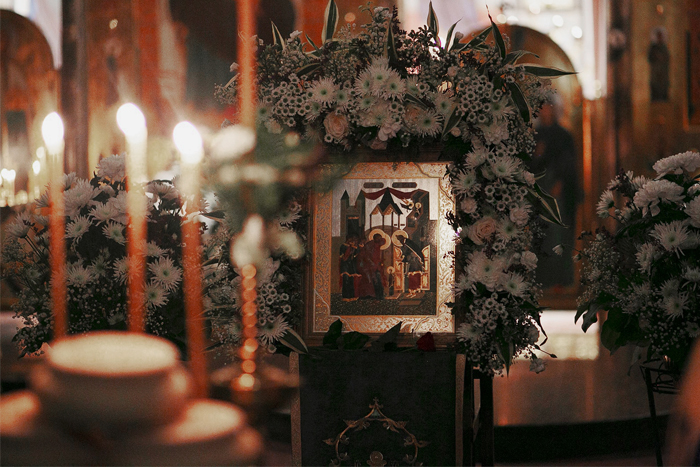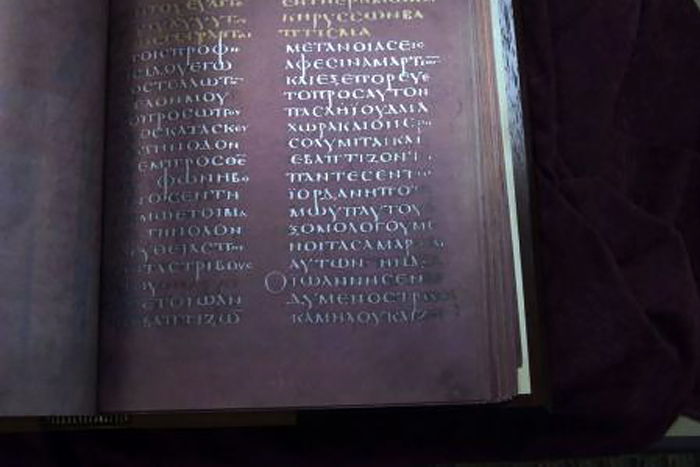
The Church in honour of the Reigning icon of the Mother of God in St Elisabeth Convent was filled with a very special devotional atmosphere on October 20. We enjoyed heartfelt singing by choirs from various countries. It was on that day that the 18th Royal Voice International Festival of Orthodox Church Music was held.
How did this unique festival emerge? What has changed in the Royal Voice format over the years? What’s unique about the festival this year and what were the surprises that it brought to its guests? We interviewed Nun Juliania (Denisova), the precentor of the Festive Choir of St Elisabeth Convent and the organiser of the Festival.
How did the Royal Voice Festival come to be?
This year, it was the eighteenth Royal Voice already, and I can say that it hasn’t changed even a little bit in the course of its history.
How did it come to be?.. It was suddenly and unexpectedly, in fact. One day, a choir from St. Sophia of Slutsk Church (Minsk) visited our Church in honour of the Reigning icon of the Mother of God and started singing. A sister of ours heard their singing and thought, “So nice! I’d like to hear other choirs in our church! We never hear them, only our own choirs.” She shared her idea with Father Andrew and the senior sisters, and they said, “Why not?” They called me, because I’m responsible for all choirs of the Convent, and told me, “Let’s try!” The Most Reverend Philaret gave his blessing, and… that was how The Royal Voice was born.
How often is the festival held?
At first, we held it three times a year: on Christmas, on Easter, and on the Holy Protection Day. That was how it happened in 2010. Later, we realised that it was too much: people hardly manage to recover from one festival when they already have to start preparations for a new one. So we left out the Christmas festival. During the last three years, we have this festival only on the Holy Protection Day because there has been a big Easter concert of a different format, which also appeared spontaneously. These two events shared the same dates, and it was too burdensome: we had to choose and focus on one or the other. That is why the Royal Voice Festival is held only on the Holy Protection Day.
What does the Festival consist of?
The Festival consists of a concert of five choirs, each with a 20-30 minute programme. It’s the traditional format since the very beginning.
How do we select the music? It has to be godly, I mean, it should have God as its source. The rest of musical culture, which you can listen to in your homes, cars, or rock and pop concerts, is okay but not here.
Our format is restrictive, of course. We are open about it and we don’t claim to be an all-encompassing festival. Choirs in Orthodox churches sing a cappella, that is, without instrumental accompaniment. People sometimes ask, “Why not?” Here is my answer to this: I’m not opposed to instrumental music per se but there are other festivals and other collectives for it. Ours is for a cappella singing. With that said, we indeed invited some priests and other people who sing and play the guitar to participate in several festivals. The audience was totally sure that this singing is godly and suitable for the church.
Of course, we never choose blindly, we listen to the tracks in advance and approve the repertoire. Sometimes we reject certain songs that the choir directors suggest because we don’t want them to contrast with the atmosphere of the concert. It’s a church, there are saints who look at us. All icons in our church contain reliquaries with the holy relics, so this presence of sacred objects must not conflict with the music that is being sung. You can’t sing “Korobeiniki” (aka Tetris theme Type A) here! It’s a well-known Russian folk song but when someone suggested it, I said, “No, that’s not the spirit that we would like to have here. Let’s replace it with another song.” There are songs about the human soul, repentance, and inner life of a human being among the rich repertoire of folk music.
I have to say that we have a very home-like format. If a precentor or a singer wants to say something, they get to say it. Sometimes participants want to present a gift to the Convent, sometimes they sing encore, and sometimes a priest takes the floor. Generally, our concert is opened by a priest who comes with one of the choirs, or a priest from our Convent, if no one comes. This opening turns everything in the right direction. People feel relaxed and at home, and that’s great.
What is the chief purpose of the Festival?
We find it important to emphasise that God penetrates our lives. He is with us at all times and He acts not only during worship, when we come to the church, pray and light up some candles. Things worked differently in Russia in old times: God penetrated every moment of the life of a human, his daily routines, and his labour. Baptisms, weddings, and funerals were always accompanied by singing. People wanted to continue singing about God outside of the church, in their daily lives. That is why we have a rich folklore heritage related to the saints, the Mother of God, feasts, ruminations of a Russian person about his soul, about his connection to the Heavenly Kingdom, the spiritual domain. Nowadays, it continues, and that is why our concert features not only church chants but also songs with the lyrics written by Russian poets, folk songs that are in harmony with the Orthodox faith, works by contemporary authors with lyrics by Orthodox poets, e.g., Father Andrei Logvinov or Hieromonk Roman (Matyushin). Not long ago, a choir from Novgorod performed a song composed by Alexandra Pakhmutova with lyrics by Dobronravov. They were famous Soviet songwriters but if you look at their songs, you’ll guess that they were believers even in those times, and now we find the topics of spirituality, morality, kindness, and love in their songs. That is why pieces like those can also be performed at our Royal Voice concerts.
There are various choirs among our participants: professional and amateur ones; secular and church choirs; male, female, and children’s choirs. All kinds of choirs. We select our participants and build the programme of the Festival to be as diverse as possible. As I’ve already mentioned, there have been several individual singers who appeared in the programme in the last three years. It often depends on subjective factors, e.g., who happens to be close to the Convent at the moment. For instance, Father Anatoly Pershin from Saint Petersburg visited our Convent, and we were so excited! He sang his brilliant songs and played the guitar. Or take for example Father Sergius Kisel, or Father Seraphim from Serbia: we invited them to participate in the Royal Voice as soon as we met them and heard their songs. All that to say that the selection process is often spontaneous. Nonetheless, there are many collectives who send us their applications first. They write to us, we — and I mean the organising committee that consists of professional church musicians — listen to them to verify that they sing well and their repertoire suits us well, and we invite them.
As a rule, there are choirs that don’t sing in church among our participants. It can be a children’s choir, a student choir or a government-funded collective. We had Belarusian Broadcasting Company Choir, National Chamber Choir of the Republic of Belarus, Academy of Music Students’ Choir, Belarusian State University Students’ Choir, and choirs from other universities. They don’t sing in church as a choir but they have church music in their repertoire. As far as I can tell, church music is a formidable part of the repertoire of many secular choirs, sometimes to the extent that they can do a full concert of church chants. Why does it happen? Because it’s beautiful, and people are drawn to the beauty, and young people are fond of this spiritual component where it isn’t the earthly and physical emotion that is stressed but something more exalted, something that lies deep within… Profoundness and sublimity: that’s what our audiences and our performers are interested in. That’s what attracts them to church vocal music.
How did your Festival go international?
It became clear that the Festival was about to attain international scope (though it’s not exactly the case with us, honestly). Choirs from Russia and Serbia started coming. We welcomed Valaam Monastery Choir, Divna Ljubojevic, a big Serbian choir from Belgrade, and some choirs from Ukraine. That’s how we gather all the Holy Russia — Russia, Ukraine, Belarus — and our sister country of Serbia. That’s where our participants come from. This Festival was no exception.
How are this year’s participants different from the previous years?
It turned out that all our participants this year were active church choirs. There weren’t children’s, students’, or secular choirs among them. All the choirs sing in churches. Imagine how pleasant it was to listen to them!
Each choir is unique.
First, there is the choir of clergy of the Diocese of Hrodna. It’s an amazing achievement to bring this choir together! To cut the long story short, this choir consists of priests and deacons. There isn’t anyone else, as it is often the case in our churches. There isn’t any altar server in this choir: all singers wear pectoral crosses! It’s impressive!
A similar choir came from Ukraine: the Choir of Kharkov Theological Seminary, which also includes its alumni who have become priests by now but who continue to sing in this choir. Add to it some girls who study to be precentors in church choirs, and you’ll get the impression of their mixed choir. It’s great and interesting. When church chants are performed by people whose life is filled with worship, whose life actually is worship, permanently and not from time to time — when everybody knows what they’re singing about and what part of the divine office this or that chant belongs to, and what its deep meaning is — you can really hear that they’re being serious. In fact, all church choirs take everything seriously. For example, there was a choir from Saint Petersburg, from a remarkable huge St. Theodore Cathedral, which was rebuilt after having been demolished in Soviet times. There are several choirs in that cathedral. They submitted an application, and we invited the so-called amateur choir, although there are professional musicians in that choir, too. It is a mixed choir, which consists of the parishioners of the cathedral and frequently takes part in divine offices. Their rector, Father Alexander Sorokin, came to Minsk with them, too. It’s their ministry, and they find it very important. Well, and we were excited to listen to a cathedral choir from Saint Petersburg!
It turned out that there is the so-called Belarusian Byzantine Choir here in Minsk, and that it sings in the Church in honour of the Resurrection of Christ. Why is it called “Belarusian”? Because it’s from Minsk. Why is it called “Byzantine”? Because they always use Byzantine chant, and that’s hard to come by nowadays. As far as our Convent is concerned, the Monastic Choir, the Festive Choir, and the Male Choir all include Byzantine chants in their repertoire but don’t sing them exclusively. Our services in their entirety don’t consist of Byzantine chant, while theirs do, and that is why the atmosphere is well-defined and interesting to listen to.
Well, our Festive Choir also decided to participate in the Festival (smiles). We took part in the very first Royal Voice Festival. We didn’t participate in the Festival until this year, and that’s not accidental: our parishioners have the chance to hear our singing every week, on Sundays and feasts, whilst this Festival allows our guests to perform in the Church in honour of the Reigning icon of the Mother of God, so that our parishioners could enjoy the singing of other choirs from other cities and countries.
Why did the Festive Choir decide to take part in the Festival this year, then?
People were always asking us: When are you going to sing at the Festival at last? I dealt with their requests for several years, and I tried to explain it as well as I could but this year, I made up my mind that we’d have to participate in the Festival. The members of our choir were also eager to perform in the Church in honour of the Reigning icon in front of our listeners. Of course, you could listen to a record on your PC or a multimedia player but here you could listen to us live! Furthermore, it’s different from how we sing during worship: there’s a difference between the sound of a choir during worship and during a concert. This difference is important and it doesn’t imply any opposition: rather, it’s mutual enrichment.
Why do people need concerts of church music, after all? Isn’t church worship enough? What do you think?
Why people need concerts of church music… Why do people need concerts of classical music? Why do people need concerts of any kind? All kinds of concerts and performers find their audience. They help people to explore the hidden parts of their souls. There are concerts that are intended to be a background noise for relaxation and recreation, like concerts of pop music. Perhaps, they are not bad, it’s just that their purpose is different: the background noise, entertainment, and fun. This kind of pastime can and should exist, if it’s morally appropriate. As far as a concert of church music is concerned… It changes a person’s soul, like concerts of classical music: people come to these concerts not just to listen to some music but also to think and feel. People have tears in their eyes. They listen to the music with such unwavering attention! They are fully engulfed by the music. That’s a mutual process that goes on between the performer and the listener. When there’s no such process, the concert goes in vain. When the audience makes noise, when people move from one place to another, when they turn their heads, cough, or look at their smartphones… I’ve noticed that people don’t dare move during our concerts because they are afraid of breaking the pious atmosphere. The intensification of this pious atmosphere is one of the reasons why we hold our concert in the church. We have a small hall in the Sunday School (you can seat 200 people there), where we held concerts of solo performers who sang and
played the guitar. However, the nave of the Church in honour of the Reigning icon of the Mother of God is our primary venue. That is where the name Royal Voice came from: it’s the voice of the Royal church. This voice is transmitted outside with the help of loudspeakers: wherever you go, you will hear the singing.
played the guitar. However, the nave of the Church in honour of the Reigning icon of the Mother of God is our primary venue. That is where the name Royal Voice came from: it’s the voice of the Royal church. This voice is transmitted outside with the help of loudspeakers: wherever you go, you will hear the singing.
What were the differences between the 18th Royal Voice Festival and the previous festivals?
Usually, one of the choirs sings the liturgy in the Church in honour of the Reigning icon of the Mother of God on the following day after the concert. This year, it was even better. We have three liturgies every Sunday, one for each of our three choirs (the Monastic Choir, the Male Choir, and the Festive Choir). This year, our guests sang during all three Sunday liturgies: the Byzantine Choir sang in the Reigning church during the first liturgy; the choir from St. Petersburg sang the second liturgy in St. Elisabeth Church; and the Choir of Kharkov Seminary together with our Festive Choir sang the third liturgy in the Church in honour of the Reigning icon of the Mother of God.
Interview by Alexandra Ursalova
St. Elisabeth Convent, 2018











